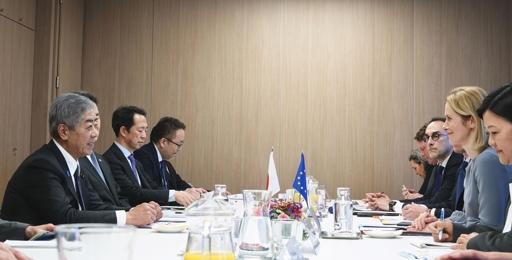Strategic cooperation in defence, economic security and diplomacy is no longer optional; it’s essential to shaping, not just surviving, the new global order
[…]
the possibility of a transactional US-China “sectoral deal”—in which Washington and Beijing strike limited agreements on trade, technology or security—as speculated by Japanese analysts poses serious risks for Japan and Europe alike. It could sideline democratic allies in favour of short-term geopolitical gains. For Japan, it recalls the trauma of Nixon’s rapprochement with Beijing, which came at Tokyo’s strategic expense. For Europe, it risks marginalisation as global rules would be shaped without its input, undermining its efforts to build coherent European defence architecture.
[…]
Japan and the EU already collaborate on digital governance, climate policy and infrastructure connectivity, but defence cooperation remains underdeveloped. The ongoing joint fighter jet project is promising, but hampered by gaps in defence procurement frameworks and technology interoperability. Japan’s rapidly evolving security posture—underscored by a rising defence budget and acquisition of counterstrike capabilities—creates a window of opportunity for deeper EU-Japan defence and industrial ties. Germany’s move to exclude defence spending from its debt brake signals a similar readiness to scale up. Both actors face shared needs in long-range strike systems, cybersecurity, and space-based assets. Europe can benefit from Japan’s experience in building resilient ammunition and weapons supply chains, while Japan could draw from European innovation, particularly from the UK, France, Germany and Sweden in emerging defence technologies.
[…]
A joint [Japan-EU] initiative on critical raw materials, open to other like-minded partners such as Canada and India, along with deeper cooperation in the field of semiconductors, would signal strategic maturity. Including small and medium businesses in shared resilience frameworks through security clearance mechanisms would also boost innovation and diversify supply chains. Brussels and Tokyo could coordinate their green industrial policies to avoid duplicative dependencies on Chinese technology while ensuring WTO compliance. Lastly, Japan and the EU should reconsider the strategic value of the Comprehensive and Progressive Agreement for Trans-Pacific Partnership (CPTPP), including the possibility of the EU joining the agreement.
[…]
[Diplomatic cooperation] becomes even more critical as both Japan and the EU face growing challenges in defending international norms amid increasingly unilateral moves by the US. Their credibility when calling out China’s coercive behaviour, for example, risks being undermined when Washington itself deviates from the principles it once championed. Yet, it is precisely in this environment of strategic ambiguity that Tokyo and Brussels must double down on their commitment to the rules-based international order—not in opposition to the US, but to preserve the very framework that ensures their long-term interests.
[…]
As the US reorients its global commitments and China tests the fault lines of Western unity, Brussels and Tokyo must show that liberal democracies can still adapt, cooperate and lead. The goal is not simply to respond to uncertainty, but to shape it. Europe and Japan do not need to reinvent the wheel—they just need to start driving it.


